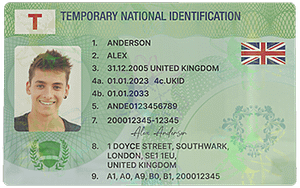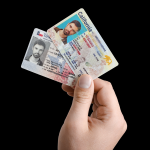What is Real ID and Why It Matters for Event Rentals
Real ID refers to a federal standard established by the U.S. government to enhance the security of state-issued identification cards and driver’s licenses. Enacted through the 2005 REAL ID Act, this regulation sets uniform criteria for the issuance of IDs, including stricter requirements for proving identity, residency, and legal status. By 2025, a Real ID-compliant card will be necessary to board domestic flights or access certain federal facilities, but its impact extends beyond these uses—especially for businesses that rely on customer verification.
For party rental companies, which provide equipment like tents, tables, chairs, and decor for events, verifying customer identity is more than a formality. These businesses often handle high-value items, and improper verification can lead to issues such as unreturned rentals, damage, or even fraudulent activity. Real ID, with its enhanced security features (e.g., holograms, machine-readable zones, and tamper-resistant materials), offers a reliable way to confirm that a customer is who they claim to be. This reduces risks and fosters trust between businesses and clients.

Why Party Rental Companies Need Robust Customer Verification
Party rentals are a cornerstone of events—weddings, birthdays, corporate gatherings, and more. However, the nature of these services creates unique vulnerabilities:
- Asset Protection: Rental equipment can cost thousands of dollars. Without verifying a customer’s identity, a company might rent to someone with no intention of returning items.
- Liability Mitigation: If rented items cause injury or property damage, tracking responsible parties requires accurate identity records.
- Fraud Prevention: Scammers may use stolen IDs to secure rentals, then sell or abandon the equipment. Verification acts as a barrier to such schemes.
- Regulatory Compliance: Some states or localities mandate identity checks for rental services, particularly for high-value items. Real ID helps meet these legal obligations.
Without effective verification, party rental companies face financial losses, operational disruptions, and damage to their reputations. Real ID provides a standardized, government-backed tool to address these challenges.
How Party Rental Companies Use Real ID for Verification
Implementing Real ID-based verification involves a structured process. Here’s how most rental businesses approach it:
1. Document Collection
Customers are asked to present a Real ID-compliant driver’s license, state ID, or another federally accepted form of identification (e.g., a U.S. passport). Rental staff check for key security features:
- A gold or black star in the top-right corner (indicating Real ID compliance)
- Microprinting on the card’s surface
- A holographic image that changes when tilted
- A machine-readable zone (MRZ) at the bottom of the card
These features make it harder to forge or alter the ID, ensuring the customer’s identity is legitimate.
2. Digital Verification Tools
Many rental companies pair physical ID checks with digital tools. For example, they might use ID scanning devices that read the MRZ to extract data (name, date of birth, address) and cross-reference it with the customer’s provided information. Some platforms integrate with databases to confirm the ID’s validity in real time, flagging discrepancies like expired cards or stolen identities.
3. Staff Training
Even with advanced tools, human judgment remains critical. Employees receive training to:
- Recognize common signs of ID fraud (e.g., mismatched photos, altered dates)
- Handle customer questions about verification policies
- Follow privacy protocols to protect sensitive ID information
Training ensures consistency in verification practices and helps maintain positive customer interactions.
4. Record-Keeping
After verification, rental companies store a copy of the ID (often digitized) in secure systems. This record serves as proof of identity in case of disputes, insurance claims, or legal issues. Strict data protection measures—such as encryption and access controls—are used to safeguard this information from breaches.
Balancing Security and Customer Experience
While verification is essential, party rental companies must avoid making the process feel intrusive. Here’s how they strike a balance:
- Transparency: Clear communication about why verification is needed (e.g., “We verify IDs to protect our equipment and ensure your event runs smoothly”) helps customers understand the purpose.
- Streamlined Process: Using digital scanners or mobile apps to capture ID info reduces wait times. Some companies allow customers to upload ID photos in advance via their website, speeding up in-person pickups.
- Empathetic Staff: Training employees to be polite and efficient during checks minimizes friction. For example, a staff member might say, “Just need to confirm a few details from your ID to finalize your reservation—this will only take a minute.”
Common Challenges and Solutions in Real ID Verification for Rentals
Despite its benefits, integrating Real ID into customer verification isn’t without hurdles. Here are five common issues and how rental companies address them:
1. “I Don’t Have a Real ID—Can I Still Rent?”
Challenge: Not all customers have Real ID-compliant IDs. Some may use passports, military IDs, or other federally accepted forms of identification. Others might be unaware of Real ID requirements.
Solution: Rental companies accept alternative valid IDs (e.g., U.S. passports, permanent resident cards) as long as they meet federal standards. They also inform customers in advance (via websites, emails, or in-store signs) about acceptable forms of ID to avoid last-minute issues.
2. “My ID Was Stolen—How Do I Rent Safely?”
Challenge: Customers with stolen IDs may struggle to verify their identity, risking delays or denied service.
Solution: Companies work with affected customers to find alternatives. For example, they might accept a temporary ID from the DMV, a police report about the theft, or additional forms of verification (e.g., utility bills with the customer’s name and address). In some cases, a trusted reference or a larger deposit may be required.
3. “Is My ID Information Secure?”
Challenge: Customers often worry about their personal data being mishandled or stolen.
Solution: Rental companies emphasize their data protection practices. This includes using encrypted storage, limiting access to ID records to authorized staff, and complying with laws like the Gramm-Leach-Bliley Act (GLBA) or state privacy regulations. Many also share privacy policies on their websites to build trust.
4. “The ID Check Took Too Long—Can It Be Faster?”
Challenge: Lengthy verification processes can frustrate customers, especially during busy event seasons.
Solution: Investing in technology like mobile ID scanners or integrating verification into online booking systems reduces in-person wait times. For example, a customer who books online can upload their ID photo beforehand, so staff only need to confirm it matches the person at pickup.
5. “What If the ID Looks Fake?”
Challenge: Detecting counterfeit IDs requires expertise, and mistakes can lead to legal issues or lost business.
Solution: Companies provide ongoing training for staff to recognize fake IDs. They also use tools like UV lights to check for hidden security features or partner with third-party verification services that specialize in ID authentication. If a fake ID is suspected, the company may politely decline service and, in severe cases, report the incident to authorities.



